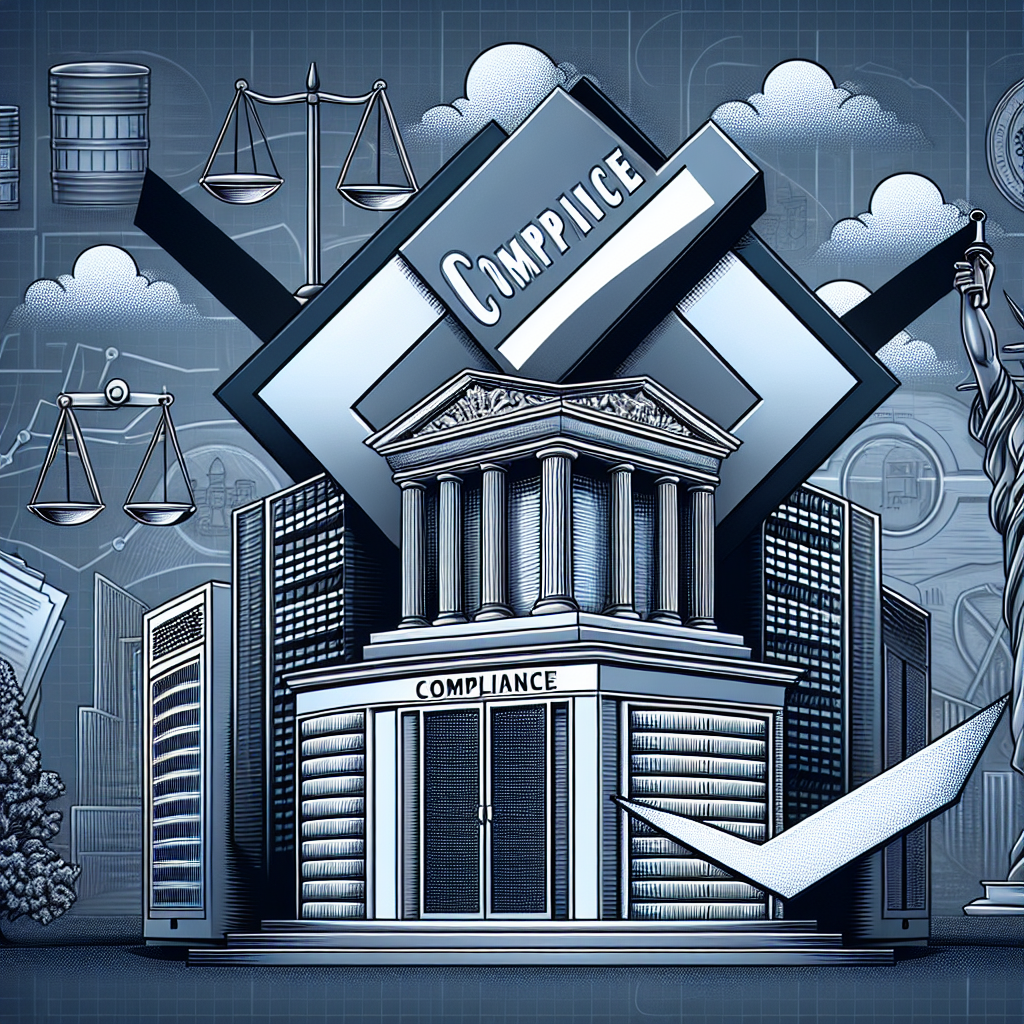Your cart is currently empty!
Tag: Regulatory

The Impact of Data Center Security Systems on Regulatory Compliance
Data centers play a crucial role in the storage and processing of sensitive data for organizations across various industries. With the increasing reliance on digital technologies and cloud-based services, data centers must prioritize security measures to protect against potential threats and ensure regulatory compliance.Regulatory compliance is a key aspect of data center security, as organizations are required to adhere to industry-specific regulations and guidelines to protect the privacy and security of their data. Failure to comply with these regulations can result in significant financial penalties and damage to a company’s reputation.
Data center security systems are essential in helping organizations meet regulatory requirements and prevent unauthorized access to sensitive data. These systems include a combination of physical security measures, such as biometric access controls, surveillance cameras, and secure entry points, as well as cybersecurity measures, such as firewalls, encryption, and intrusion detection systems.
One of the key benefits of implementing robust data center security systems is the ability to monitor and track access to sensitive data in real-time. This allows organizations to quickly identify and respond to any security breaches or unauthorized access attempts, helping to mitigate the risk of data loss or theft.
Furthermore, data center security systems help organizations demonstrate compliance with regulatory requirements through the implementation of industry best practices and security standards. By investing in state-of-the-art security technologies and regularly updating security protocols, organizations can ensure that their data center meets the stringent requirements set forth by regulatory bodies.
In addition to protecting sensitive data and ensuring regulatory compliance, data center security systems also offer other benefits, such as improving operational efficiency, reducing downtime, and enhancing overall data center performance. By investing in security measures that are tailored to their specific needs and requirements, organizations can strengthen their overall security posture and protect their most valuable assets.
In conclusion, the impact of data center security systems on regulatory compliance cannot be overstated. By investing in robust security measures and implementing industry best practices, organizations can protect their sensitive data, meet regulatory requirements, and maintain the trust and confidence of their customers and stakeholders. It is essential for organizations to prioritize data center security and compliance to safeguard against potential threats and ensure the long-term success of their operations.

Ensuring Regulatory Compliance in Your Data Center
In today’s digital age, data centers play a critical role in storing and processing vast amounts of information for businesses and organizations. With the increasing amount of data being generated and stored, it is more important than ever to ensure regulatory compliance in data centers to protect sensitive information and avoid potential legal consequences.Regulatory compliance refers to the adherence to laws, regulations, and industry standards that govern the handling and storage of data. Failure to comply with these regulations can result in hefty fines, lawsuits, and damage to a company’s reputation. Therefore, it is essential for data center operators to implement robust policies and procedures to ensure compliance with relevant regulations.
One of the key regulations that data centers must comply with is the General Data Protection Regulation (GDPR) in the European Union. The GDPR sets strict guidelines for the collection, storage, and processing of personal data, and failure to comply can result in fines of up to 4% of a company’s annual global turnover. Data center operators must ensure that they have the necessary safeguards in place to protect personal data and adhere to GDPR requirements.
In addition to GDPR, data centers may also need to comply with other regulations such as the Health Insurance Portability and Accountability Act (HIPAA) in the United States, which governs the handling of electronic protected health information. Other industry-specific regulations, such as the Payment Card Industry Data Security Standard (PCI DSS) for companies that process credit card payments, also require data centers to meet specific security requirements.
To ensure regulatory compliance in a data center, operators should implement a comprehensive compliance program that includes the following key components:
1. Data classification and inventory: Data center operators should classify data based on its sensitivity and importance, and maintain an inventory of all data stored in the facility. This will help in identifying and protecting sensitive information and ensuring compliance with relevant regulations.
2. Access controls: Implementing strict access controls is crucial to prevent unauthorized access to data. Data center operators should restrict access to sensitive information to only authorized personnel and regularly review access permissions to ensure compliance with regulatory requirements.
3. Data encryption: Encrypting data at rest and in transit is essential to protect sensitive information from unauthorized access. Data center operators should implement strong encryption protocols to ensure compliance with data protection regulations.
4. Regular audits and assessments: Conducting regular audits and assessments of data center operations is essential to identify any compliance gaps and address them promptly. Data center operators should also perform vulnerability assessments and penetration testing to ensure the security of their systems.
5. Employee training: Providing comprehensive training to data center staff on regulatory requirements and best practices for data security is crucial to ensuring compliance. Employees should be aware of their responsibilities and the potential consequences of non-compliance.
In conclusion, ensuring regulatory compliance in a data center is essential to protect sensitive information and avoid legal consequences. By implementing robust policies and procedures, data center operators can demonstrate their commitment to data security and compliance with relevant regulations. By prioritizing compliance, data center operators can build trust with customers and stakeholders and safeguard their reputation in an increasingly data-driven world.

Ensuring Compliance and Regulatory Requirements with Data Center Monitoring
Data centers play a crucial role in the operations of businesses, as they house the critical IT infrastructure and data that are essential for daily operations. With the increasing digitization of businesses and the rising importance of data, ensuring compliance and regulatory requirements with data center monitoring has become more important than ever.Compliance and regulatory requirements are essential for data centers to operate legally and securely. Failure to comply with these regulations can result in hefty fines, damage to reputation, and even legal action. Therefore, it is crucial for businesses to implement robust data center monitoring practices to ensure compliance with regulations such as HIPAA, GDPR, PCI DSS, and others.
Data center monitoring involves the continuous monitoring and management of the data center’s infrastructure, including servers, storage, networking equipment, and environmental factors such as temperature and humidity. By monitoring these aspects, businesses can ensure that their data center is operating efficiently, securely, and in compliance with regulatory requirements.
One of the key aspects of data center monitoring is security monitoring. This involves monitoring the data center for any unauthorized access, security breaches, or unusual activities that could compromise the security of the data center. By implementing security monitoring tools such as intrusion detection systems, businesses can detect and respond to security incidents in real-time, ensuring the integrity and confidentiality of their data.
Another important aspect of data center monitoring is environmental monitoring. Data centers are sensitive environments that require specific conditions to operate efficiently, such as temperature, humidity, and airflow. By monitoring these environmental factors, businesses can ensure that their data center is operating within the optimal conditions, reducing the risk of equipment failure and downtime.
In addition to security and environmental monitoring, businesses should also monitor the performance of their data center infrastructure. By monitoring the performance of servers, storage, and networking equipment, businesses can identify and address any potential bottlenecks or issues that could impact the performance of their data center. This proactive approach to monitoring can help businesses prevent downtime and ensure the availability and reliability of their data center.
To ensure compliance and regulatory requirements with data center monitoring, businesses should implement a comprehensive monitoring strategy that includes security, environmental, and performance monitoring. By investing in monitoring tools and technologies, businesses can automate the monitoring process, detect issues in real-time, and respond proactively to potential security threats or performance issues.
In conclusion, ensuring compliance and regulatory requirements with data center monitoring is essential for businesses to operate securely and legally. By implementing robust data center monitoring practices, businesses can proactively monitor their data center infrastructure, detect issues in real-time, and ensure the availability and integrity of their data. Investing in monitoring tools and technologies is crucial for businesses to meet regulatory requirements and avoid costly fines and legal action.

Ensuring Regulatory Compliance through Effective Data Center Audits
In today’s digital age, data centers play a critical role in storing and processing vast amounts of information for organizations across various industries. With the increasing reliance on data centers to support business operations, ensuring regulatory compliance has become a top priority for companies to avoid costly penalties and reputational damage.One of the key strategies to ensure regulatory compliance in data centers is through effective audits. These audits help organizations evaluate their data center infrastructure, processes, and controls to identify areas of non-compliance and implement necessary corrective actions. By conducting regular audits, companies can proactively address compliance issues and mitigate potential risks before they escalate.
There are several important components to consider when conducting data center audits to ensure regulatory compliance. Firstly, organizations must have a clear understanding of the regulatory requirements that apply to their specific industry and geographic location. This includes laws and regulations related to data privacy, security, and retention, such as GDPR, HIPAA, and PCI DSS.
Secondly, companies should establish a comprehensive audit plan that outlines the scope, objectives, and methodologies of the audit process. This plan should involve key stakeholders from IT, legal, compliance, and auditing departments to ensure a thorough and collaborative approach to the audit.
During the audit, organizations should assess various aspects of their data center environment, including physical security measures, network infrastructure, data backups, disaster recovery plans, and access controls. Auditors should also review documentation, policies, and procedures to ensure they align with regulatory requirements and industry best practices.
After completing the audit, organizations must analyze the findings and develop a remediation plan to address any identified gaps or deficiencies. This may involve implementing new security controls, updating policies and procedures, enhancing employee training, or investing in new technology solutions to strengthen data center compliance.
In addition, companies should conduct regular follow-up audits to monitor progress and verify that corrective actions have been effectively implemented. By continuously evaluating and improving data center compliance measures, organizations can maintain a secure and compliant environment to protect sensitive information and maintain customer trust.
In conclusion, ensuring regulatory compliance through effective data center audits is essential for organizations to safeguard their data assets, mitigate risks, and demonstrate accountability to regulators and stakeholders. By following best practices and investing in proactive audit processes, companies can strengthen their compliance posture and avoid potential legal and financial consequences associated with non-compliance.

Data Center Compliance: Best Practices for Ensuring Regulatory Compliance
In today’s digital age, data centers play a crucial role in storing and processing vast amounts of information for businesses and organizations. With this increased reliance on data centers, the need for regulatory compliance has become more important than ever.Data center compliance refers to the adherence to various regulations and standards set by governing bodies to ensure the security, privacy, and integrity of data stored within these facilities. Failure to comply with these regulations can result in severe penalties, legal action, and damage to a company’s reputation.
To help ensure regulatory compliance, data center operators should implement best practices that align with industry standards and regulations. Here are some key considerations for data center compliance:
1. Understand Regulatory Requirements: The first step in ensuring compliance is to understand the specific regulations that apply to your organization. This may include industry-specific regulations such as HIPAA for healthcare organizations or GDPR for companies operating in the European Union.
2. Implement Security Measures: Data centers should implement robust security measures to protect sensitive data from unauthorized access, theft, or data breaches. This may include encryption, access controls, physical security measures, and regular security audits.
3. Regular Audits and Assessments: Regular audits and assessments of data center operations are essential to identify and address any compliance issues. These audits can help identify vulnerabilities, gaps in security measures, or areas of non-compliance that need to be addressed.
4. Disaster Recovery and Business Continuity Planning: Data centers should have robust disaster recovery and business continuity plans in place to ensure data availability in the event of a disaster or outage. Regular testing of these plans is essential to ensure they are effective and compliant with regulatory requirements.
5. Employee Training and Awareness: Employees play a crucial role in ensuring data center compliance. Providing regular training and awareness programs on data security, privacy, and compliance can help prevent human errors and ensure that employees understand their responsibilities in maintaining regulatory compliance.
6. Data Governance and Documentation: Data centers should have clear policies and procedures in place for data governance and documentation. This includes data retention policies, data classification, and documentation of data processing activities to demonstrate compliance with regulatory requirements.
By following these best practices, data center operators can ensure regulatory compliance and mitigate the risk of costly penalties and reputational damage. Investing in compliance measures not only protects sensitive data but also builds trust with customers and stakeholders by demonstrating a commitment to data security and privacy.

The Role of Data Center Inspections in Maintaining Compliance and Regulatory Standards
Data centers play a crucial role in today’s digital economy, serving as the backbone of countless businesses and organizations. These facilities house the servers, storage devices, and networking equipment that support the vast amount of data generated and accessed by users around the world. With such a vital function, it is essential that data centers adhere to strict compliance and regulatory standards to ensure the security, reliability, and efficiency of their operations.One of the key aspects of maintaining compliance and regulatory standards in data centers is regular inspections. These inspections involve a comprehensive assessment of the facility’s infrastructure, equipment, and operational practices to ensure they meet industry-specific requirements and guidelines. By conducting regular inspections, data center operators can identify and address potential issues before they escalate into major problems that could compromise the facility’s performance or security.
There are several key areas that data center inspections typically focus on to maintain compliance and regulatory standards. These include:
1. Physical security: Data centers house sensitive information and critical infrastructure, making them prime targets for security breaches. Inspections assess the facility’s physical security measures, such as access controls, surveillance cameras, and alarm systems, to ensure they are adequate to protect against unauthorized access and theft.
2. Environmental controls: Data centers rely on precise environmental controls, such as temperature and humidity regulation, to ensure the optimal performance and longevity of their equipment. Inspections evaluate these controls to ensure they are functioning correctly and within the recommended range to prevent equipment failures and downtime.
3. Power and cooling systems: Data centers consume a significant amount of power to operate their servers and cooling systems. Inspections assess the efficiency and reliability of these systems to ensure they are capable of supporting the facility’s workload and maintaining uptime during power outages or cooling failures.
4. Fire suppression systems: Data centers are at risk of fire due to the high concentration of electrical equipment and wiring. Inspections evaluate the facility’s fire suppression systems, such as sprinklers, alarms, and extinguishers, to ensure they are up to code and capable of containing and extinguishing fires quickly to minimize damage and downtime.
By conducting regular inspections and addressing any issues that are identified, data center operators can demonstrate their commitment to maintaining compliance and regulatory standards. This not only helps to protect the facility’s operations and reputation but also builds trust with customers and stakeholders who rely on the data center’s services.
In conclusion, data center inspections play a vital role in maintaining compliance and regulatory standards in the digital age. By focusing on key areas such as physical security, environmental controls, power and cooling systems, and fire suppression systems, data center operators can ensure their facilities meet industry-specific requirements and guidelines. By investing in regular inspections and addressing any issues that are identified, data centers can continue to operate efficiently, securely, and in compliance with regulatory standards.

Data Center Compliance: A Critical Component of Regulatory Compliance Strategies
In today’s highly regulated business environment, data center compliance is a critical component of regulatory compliance strategies. With the increasing amount of sensitive data being stored and processed in data centers, organizations must ensure that they are in compliance with a variety of regulations and standards to protect their data and avoid costly fines and penalties.Data center compliance encompasses a wide range of regulations and standards, including industry-specific regulations such as HIPAA for healthcare organizations, GDPR for companies operating in the European Union, and PCI DSS for organizations that handle credit card information. In addition to these industry-specific regulations, organizations must also comply with general data protection regulations like the California Consumer Privacy Act (CCPA) and the General Data Protection Regulation (GDPR).
Ensuring data center compliance involves implementing a variety of security measures to protect sensitive data. This includes physical security measures such as access controls, surveillance cameras, and biometric authentication, as well as logical security measures such as encryption, firewalls, and intrusion detection systems. Data center compliance also requires organizations to have policies and procedures in place for data handling, access control, and incident response.
Failure to comply with data center regulations can have serious consequences for organizations, including fines, legal liabilities, and damage to their reputation. In addition to financial penalties, organizations that fail to comply with data center regulations may also face lawsuits from individuals whose data has been compromised.
To ensure data center compliance, organizations should conduct regular audits of their data center operations to identify any potential compliance issues and take corrective action. They should also stay informed about changes to regulations and standards that may impact their data center operations and update their compliance strategies accordingly.
In conclusion, data center compliance is a critical component of regulatory compliance strategies for organizations that store and process sensitive data. By implementing robust security measures, policies, and procedures, organizations can protect their data, avoid costly fines and penalties, and maintain the trust of their customers and stakeholders.

The Role of Data Center Inspections in Achieving Compliance and Regulatory Standards
Data centers are crucial components of modern business operations, housing the servers and networking equipment that keep organizations running smoothly. With the increasing reliance on technology in today’s digital age, ensuring that data centers are compliant with regulatory standards is more important than ever. Data center inspections play a vital role in achieving compliance and maintaining regulatory standards.Regulatory standards are put in place to ensure the privacy, security, and integrity of data stored in data centers. Failure to comply with these standards can result in severe consequences, including hefty fines, legal action, and damage to an organization’s reputation. By conducting regular inspections, data center operators can identify and address any issues that may put them at risk of non-compliance.
During a data center inspection, trained professionals carefully assess all aspects of the facility, including the physical infrastructure, cooling systems, power distribution, and security measures. They also review documentation and procedures to ensure that data center operations are in line with industry best practices and regulatory requirements.
One of the key benefits of data center inspections is that they help organizations identify potential vulnerabilities and weaknesses in their infrastructure. This allows them to take proactive measures to address these issues before they escalate into more significant problems. By staying ahead of potential compliance issues, organizations can reduce the risk of data breaches and other security incidents.
Furthermore, data center inspections can also help organizations optimize their operations and improve efficiency. By identifying areas for improvement, such as outdated equipment or inefficient cooling systems, organizations can make strategic investments to enhance their data center performance and reduce operational costs.
In addition to regulatory compliance, data center inspections are also essential for achieving industry certifications, such as ISO 27001 or PCI DSS. These certifications demonstrate to customers and stakeholders that an organization is committed to maintaining high standards of data security and privacy. By regularly undergoing inspections and obtaining certifications, organizations can enhance their credibility and competitiveness in the market.
In conclusion, data center inspections play a critical role in achieving compliance and regulatory standards. By conducting regular inspections, organizations can identify and address potential vulnerabilities, optimize their operations, and demonstrate their commitment to data security and privacy. Investing in data center inspections is a proactive measure that can help organizations mitigate risks, protect their data, and maintain a competitive edge in today’s ever-evolving business landscape.

Ensuring Data Center Compliance: Strategies for Success in a Complex Regulatory Environment
In today’s digital age, data centers play a crucial role in storing and processing massive amounts of data for businesses of all sizes. With the increasing importance of data security and privacy, ensuring compliance with various regulations and standards has become a top priority for data center operators. Failure to comply with these regulations can result in hefty fines, legal consequences, and damage to a company’s reputation.In a complex regulatory environment, data center compliance can be a daunting task. However, with the right strategies and best practices in place, businesses can navigate the regulatory landscape effectively and ensure the protection of their data assets.
One of the first steps in ensuring data center compliance is understanding the regulatory requirements that apply to your business. Different industries and geographic regions have specific regulations governing data security, privacy, and retention. Some of the key regulations that data center operators need to comply with include the General Data Protection Regulation (GDPR), the Health Insurance Portability and Accountability Act (HIPAA), the Payment Card Industry Data Security Standard (PCI DSS), and the Sarbanes-Oxley Act (SOX).
Once you have identified the relevant regulations, the next step is to implement a robust compliance framework within your data center. This framework should include policies, procedures, and controls that address the specific requirements of each regulation. Regular audits and assessments should be conducted to ensure that the data center is in compliance with these regulations at all times.
In addition to implementing a compliance framework, data center operators should also invest in security technologies and tools to protect their data assets. Encryption, firewalls, intrusion detection systems, and access controls are just a few of the security measures that can help prevent data breaches and unauthorized access to sensitive information.
Training and awareness programs are also essential to ensure that all employees understand their roles and responsibilities in maintaining data center compliance. Regular training sessions should be conducted to educate employees about the latest security threats and best practices for safeguarding data.
Lastly, data center operators should stay informed about changes in regulations and industry standards that may impact their compliance efforts. By staying up-to-date on regulatory developments, businesses can proactively address any new requirements and avoid potential compliance pitfalls.
In conclusion, ensuring data center compliance in a complex regulatory environment requires a proactive and comprehensive approach. By understanding the regulatory landscape, implementing a robust compliance framework, investing in security technologies, conducting regular audits, and staying informed about industry developments, businesses can navigate the compliance maze effectively and safeguard their data assets. Compliance may be complex, but with the right strategies in place, businesses can achieve success in the ever-evolving regulatory environment.

The Role of Compliance in Data Center Audits: Meeting Regulatory Requirements
In today’s digital age, data centers play a crucial role in storing and processing vast amounts of information for businesses of all sizes. With the increasing reliance on data centers to store sensitive information, it is essential for organizations to ensure that their data centers comply with regulatory requirements to protect data privacy and security.One key aspect of ensuring compliance in data centers is conducting regular audits to assess whether the data center meets regulatory standards. Compliance audits are essential for businesses to demonstrate that they are following industry best practices and regulatory requirements for data protection.
The role of compliance in data center audits is to verify that the data center is operating in accordance with relevant laws and regulations, such as the General Data Protection Regulation (GDPR), the Health Insurance Portability and Accountability Act (HIPAA), and the Payment Card Industry Data Security Standard (PCI DSS).
Compliance audits typically involve a thorough examination of the data center’s physical security measures, network security protocols, data encryption practices, and disaster recovery plans. Auditors will also review documentation, policies, and procedures to ensure that the data center has implemented adequate controls to protect sensitive information.
By conducting regular compliance audits, organizations can identify and address any potential vulnerabilities or gaps in their data center security measures before they lead to data breaches or regulatory penalties. Audits also provide assurance to customers, partners, and regulators that the organization takes data protection seriously and is committed to safeguarding their information.
In addition to meeting regulatory requirements, compliance audits can also help organizations improve their overall data center operations and security posture. By identifying weaknesses and areas for improvement, organizations can implement changes to enhance their data center security and reduce the risk of data breaches.
Overall, the role of compliance in data center audits is essential for ensuring that organizations are meeting regulatory requirements and protecting sensitive information. By conducting regular audits and addressing any issues that arise, organizations can demonstrate their commitment to data protection and safeguarding the privacy of their customers and stakeholders.
